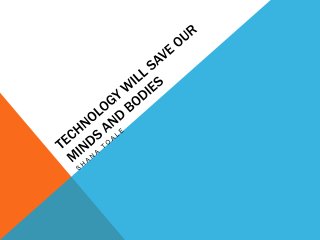
Social impact
- 2. WHAT IS MEDICAL TECHNOLOGY ? Medical technology can be considered as any technology used to save lives in individuals suffering from a wide range of conditions. In its many forms, medical technology is already diagnosing, monitoring and treating virtually every disease or condition that affects us.
- 3. STEM CELL RESEARCH • Stem cells are biological cells, found in all multicellular organisms. They can be divided into specialized cells, for example, muscles, blood, and brain tissues. • Stem cell research is a relatively new technology that takes primitive human cells and develops them into most any of the 220 varieties of cells in the human body, including blood cells and brain cells • Some scientists and researchers have great hope for this research and its ability to uncover treatments and possibly even cures for some of the worst diseases including heart disease, diabetes, and neurodegenerative diseases like Alzheimer's and Parkinson's. Along with these hopeful possibilities, stem cell research also gives rise to fear of human cloning and serious concerns over the ethics of conducting scientific research on, which includes the destruction of, human embryos.
- 5. DIFFERENT TYPES OF STEM CELL RESEARCH Human stem cells primarily come from embryos or adult tissue. • Embryonic stem cells can be created can be screated for the purpose of stem cell research or they can be leftover from other process, such as from in-vitro fertilization. • Fertility treatments usually result in the creation of multiple embryos, and since only the most viable are selected for implantation, some embryos are not used. • These extra embryos can be discarded, donated to others seeking fertility assistance, preserved, or donated to research; most commonly, leftover embryos are discarded.
- 6. ETHICAL ISSUES Stem cell research brings in two major issues; 1) Human cloning 2) Whether these embryos, or pre-embryos as some refer to them, are human life • When it first gained popularity, researchers were concerned with the potential for using stem cells to clone humans • Many argue that it is not within man’s judgment to manufacture, manipulate, or destroy human life . • The other major ethical issue related to stem cell research involves the ongoing debate over when life begins. Some say that life begins at conception and that the use of humans, even immature ones, for research purposes is unethical. • Others says the embryos are only tiny amounts of undifferentiated tissue and since they are already scheduled for destruction, and have great potential benefit, they should be used to potentially help others.
- 7. ADVANCEMENTS IN THE MEDICAL FIELD Bionic Limbs • Patients will have more control over there prosthetic limbs. • Makes the prosthetic limbs more assessable in everyday life. • Makes patient more active and interactive in life. • Electrodes placed on the brain and the limb being attached to the patient
- 8. ENVIRONMENTAL ISSUES • Many plants will be created all over the world, which will all contribute to polluting the environment. • Stem cell research will lead to cloning, which in turn will lead to over population, which then leads to many other things like more houses, more driving, which is more gas, and so on and so forth.
- 9. CONCLUSION • Medical technology has been great for society. It has helped families who cant reproduce, reproduce. Help assist people with life threatening disease, in order to extend there life time. We have come a long way over the years, but in the end medical technology will never be perfect, there will other be a new discover, something we need, and a wonder new invention. All we can do is hope for the best, and hope medical technology continues to safe lives.
- 10. REFERENCES • wiseGEEK (2012). Retrieved from http://www.wisegeek.com/what-is- stem-cell-research.htm • Erik Sofage, (2012). Smart Bionic Limbs are Reengineering the Human. Retrieved from http://www.popularmechanics.com/science/health/prosthetics/smart- bionic-limbs-are-reengineering-the-human-9160299